Bulletin for April 27, 2025
Download Sunday’s BulletinUpdates
- This week, I’ll be out, but our familiar friend Pastor Ron Pierce will be preaching. Be sure to give him a great welcome.
- If you or your child are going to youth camp on June 2-6, be sure to text me your shirts sizes as soon as possible so I can complete our registration.
- Presbytery meets this Friday and Saturday. Please be in prayer as we meet in Meridian.
Your friend in Christ,
Reid
Bulletin for April 20, 2025
Download Sunday’s Bulletin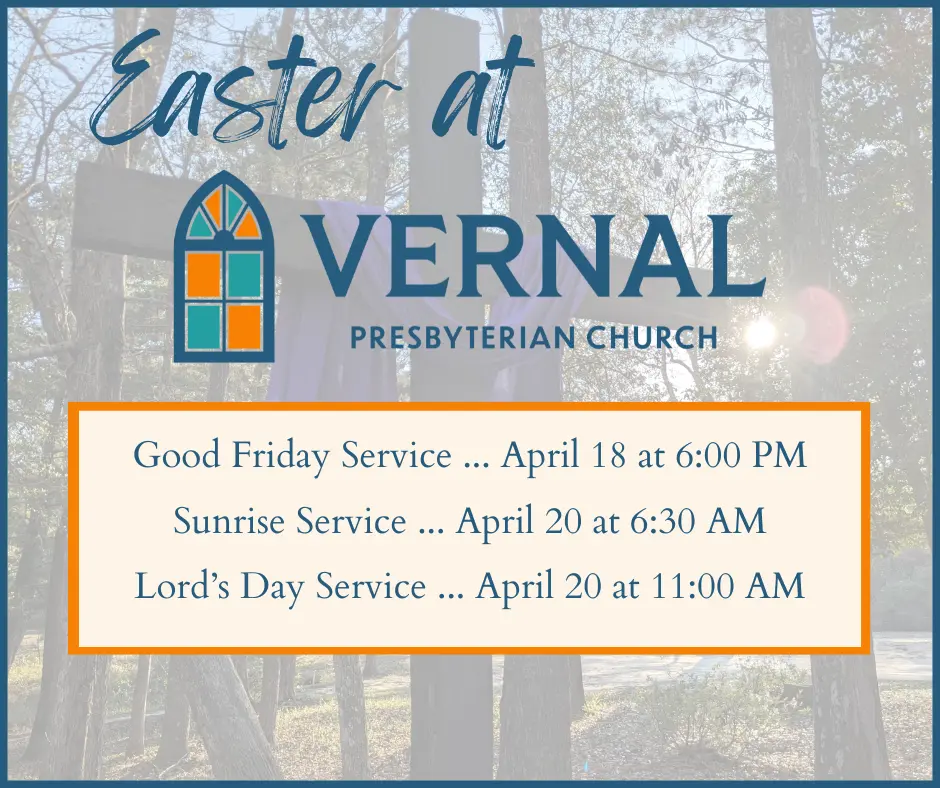
It’s Easter! Be sure to check out the bulletin and invite your friends and family to this weekend’s services!
Bulletin for April 13, 2025
Download Sunday’s BulletinTime for Easter!

Be sure to join us for all of our services over the next week.
- This Sunday, we’ll celebrate Palm Sunday at our regular Lord’s Day service.
- Our Good Friday service will be Friday at 6:00. Communion will be served.
- On Easter, we’ll have our regular Lord’s Day service at 11, and our Sunrise Service at 6:30 AM in the Prayer Garden.
Remember to invite your friends and family to join us for all these celebrations!
Your friend in Christ,
Reid
Bulletin for April 6, 2025
Download Sunday’s BulletinWorship this Week
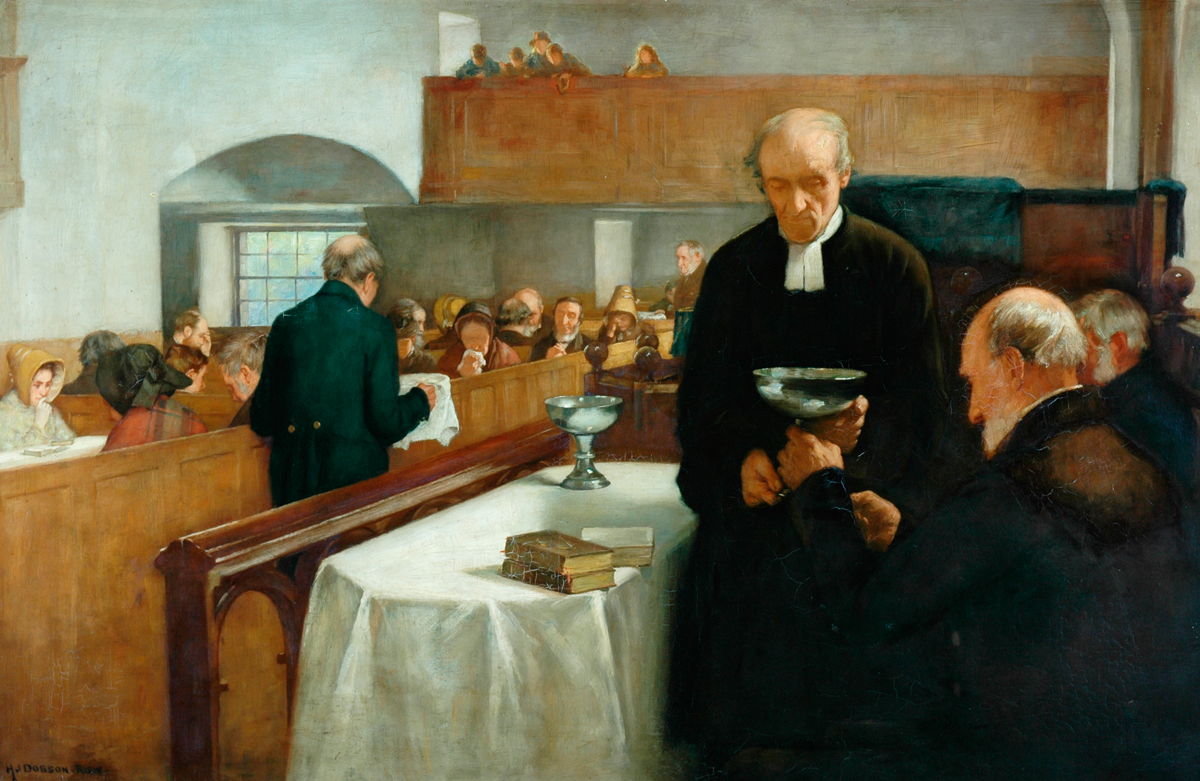
The Lord’s Supper will be served this week. All baptized members of Bible-believing churches are welcome to partake, but according to Scripture’s command, we are all called to examine ourselves as we come. Over the next few days, consider Larger Catechism 171 as an example for how to do that:
Q. 171. How are they that receive the sacrament of the Lord’s supper to prepare themselves before they come unto it?
A. They that receive the sacrament of the Lord’s supper are, before they come, to prepare themselves thereunto, by examining themselves of their being in Christ, of their sins and wants; of the truth and measure of their knowledge, faith, repentance; love to God and the brethren, charity to all men, forgiving those that have done them wrong; of their desires after Christ, and of their new obedience; and by renewing the exercise of these graces, by serious meditation, and fervent prayer.
Also, remember to continue to invite your family and friends to our Easter services. Invite cards are available in the vestibule. If you’ve already given out three, feel free to grab more and reach out to even more people!
Your friend in Christ,
Reid
Bulletin for March 30, 2025
Download Sunday’s BulletinDoes God change His mind?
As we studied Exodus 32, we ran across this statement:
“And the LORD relented from the disaster that he had spoken of bringing on his people.” (Exodus 32:14)
This is just one place where the Bible seems to speak of God changing his mind, and I got several questions about that statement in the weeks following. Perhaps a more striking example is found in 1 Samuel 15.
The word “regret” appears three times in 1 Samuel 15. In verses 11 and 35, God is described at regretting his decision to anoint Saul king. But verse 29 says:
“And also the Glory of Israel will not lie or have regret, for he is not a man, that he should have regret.”
What are we supposed to do with these seemingly contradictory statements? On the one hand, the Bible seems to clearly say that God’s mind has changed, but on the other hand, it also seems to clearly say that God’s mind cannot change.
Well, when it comes to these difficult problems, we must always use the principle that Scripture interprets Scripture. Our Confession of Faith summarizes this principle as follows:
“The infallible rule of interpretation of Scripture is the Scripture itself: and therefore, when there is a question about the true and full sense of any Scripture (which is not manifold, but one), it must be searched and known by other places that speak more clearly.”
To apply this principle, we need to take the whole Bible together, and what we find is that the clear testimony of Scripture is that God does not change. Consider this list of Scriptures:
- Psalm 33:11
- Malachi 3:6
- Hebrews 1:12
- Hebrews 6:17-18
- James 1:17
Now, there are two ways we could approach this. We could either read the change Scriptures in light of the no-change Scriptures or the other way around.
Just as a thought experiment, what would it look like to give the change Scriptures interpretive priority over the no-change Scriptures. We would begin by affirming that God really does change his mind, and then we would have to go to these other Scriptures and figure out an appropriate interpretation. Here’s where the problem lies: if we believe that God does change his mind, is there any way to interpret the no-change Scriptures faithfully (in the plain meaning of the words)? The answer is no! But we can interpret the change Scriptures in light of the no-change Scriptures faithfully.
We start by affirming that God does not change according to the clear testimony of Scripture. Then, we can look at the change Scriptures to see if there are faithful ways to interpret those passages in light of God’s unchanging nature. What we find is that there is actually more than one way to do this.
First, we might talk about anthropomorphism, that is, ascribing human characteristics to non-humans. We do this all the time with animals and inanimate objects. If I say that the copy machine is fighting me, we all know that the copy machine doesn’t actually have any animosity toward me, but that language helps us understand what’s happening. The same is true when we speak of God anthropomorphically. We know that God is not a man, but we speak, and often Scripture speaks, of God on human terms to help us understand God better. So when we say God changed his mind, we’re not saying that literally, but we’re using those words as a merely human description to get at something deeper.
Second, while God himself does not change, our experience of God does. Think of your experience of the Sun. The Sun has a regular course in the sky, completely independent of your location. But your understanding of the Sun changes depending on whether you’re inside or outside, whether you’re wearing sunscreen, whether you’re hot or cold, etc. Now, if I say something like, “The Sun finally decided to go down,” does that mean that the Sun made a conscious decision to stop shining? No! When we or Scripture say that God changed his mind, the same is true. It’s not as if God has changed; he’s always the same. But our experience or understanding of God has changed.
This is the best way to understand the apparent conflict between the change and no-change passages, and it’s the way the Church through the ages has always understood these passages. A deeper discussion of this question requires a dive into philosophy, so I won’t go there now. But if you’re interested, I did three lectures on this topic a few years ago that you can find here.
Easter Schedule

Be sure to join us for our Easter services, and invite your friends too! Easter is a great opportunity for outreach to our community. Many people, whether they ordinarily go to church or not, are happy to join you for this one week. If each of us invites just three people, we’ll have extended almost 200 invitations.
On Sunday, I’ll have some cards with information that you can share with your friends and neighbors as we get ready for our Resurrection celebrations.
Congregational Meeting
This week, we’ll also have our congregational meeting immediately following the worship service. Agendas are available on the hallway table at the church. If you have any questions for me or any of the nominees, be sure to ask them before Sunday!
Upcoming Communion services
We’ll have communion twice in April. First, we’ll have regularly stated Lord’s Day communion next week on April 6. Our Good Friday service will also be a special communion service.
If you plan on participating in either service, be sure to be preparing your hearts. As always, if you profess faith in Jesus Christ and are a baptized member of a Bible-believing church, you are welcome to partake from the Table.
Your friend in Christ,
Reid
Bulletin for March 23, 2025
Download Sunday’s BulletinChrist the Priest
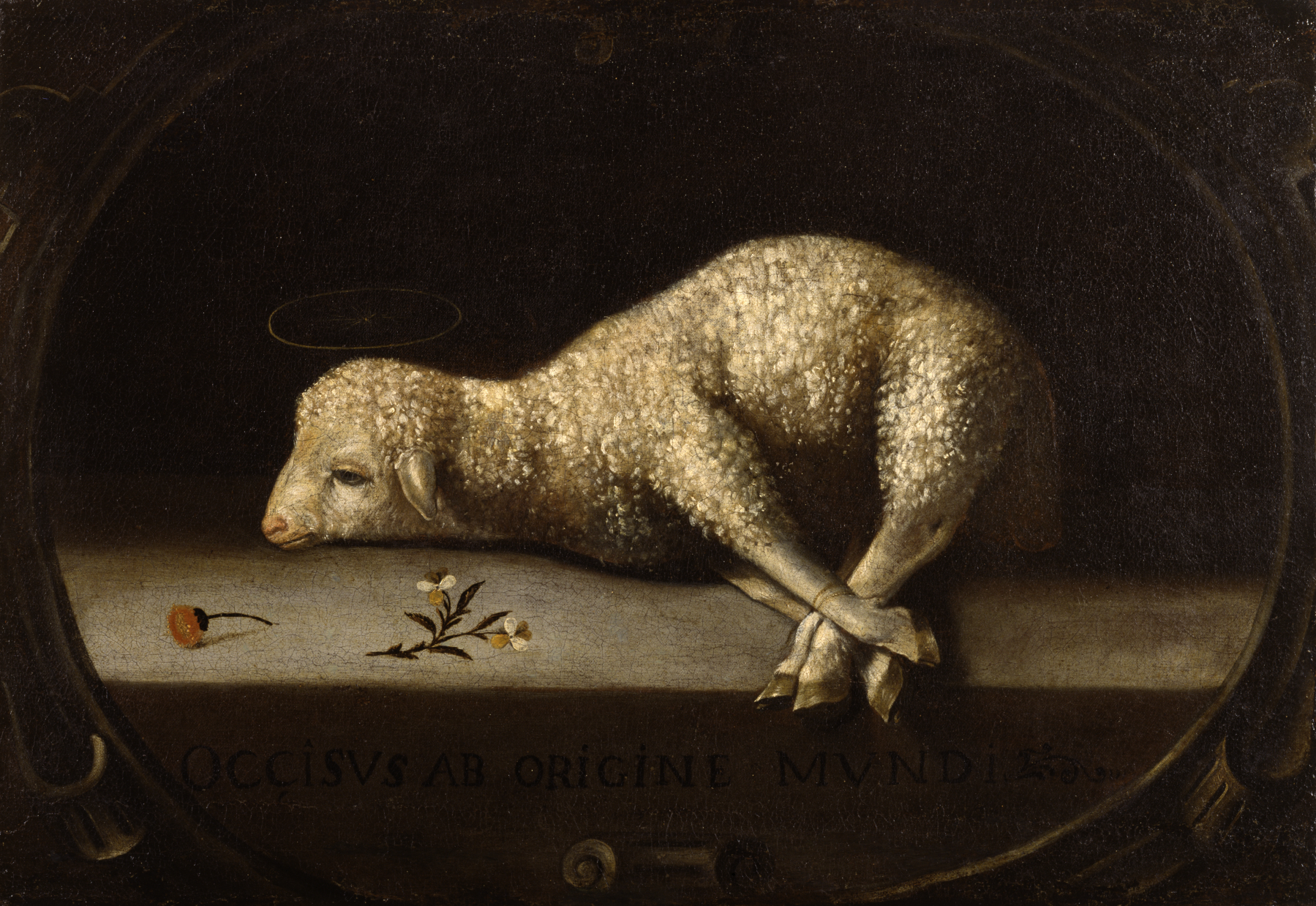
Christ’s prophetic office is primarily about how God communicates with us. But it’s one thing for God to speak to us and another thing entirely for us to speak to God. In order to do that, we need a mediator; we need a priest. A priest stands before God on behalf of the people. The priest is the way that the people can interact with God.
We’ve already spoken about how Christ is the only Redeemer of God’s elect, and when we come to his priesthood, we’re talking about how he redeems us. So how is it that we can approach God?
Q. 25. How doth Christ execute the office of a priest?
A. Christ executeth the office of a priest, in his once offering up of himself a sacrifice to satisfy divine justice, and reconcile us to God; and in making continual intercession for us.
Notice that the catechism gives two ways that Christ executes the office of a priest. First, he executes the office of a priest in his once offering up of himself a sacrifice. We know, of course, that this was what Christ was doing on the cross, and truly in all his sufferings. He was doing the ultimate priestly work of giving his own life for the people. All other priests offer up other sacrifices, but Christ gave his own life as a sacrifice for sins. He is himself the lamb brought to slaughter (Isaiah 53:7).
This achieved a twofold redemption. First, Christ’s sacrifice satisfied divine justice. The word we often use for this is propitiation. A propitiation is a kind of covering. In this case, Christ is our covering from the wrath of God, a shield against righteous judgment and a protection against God’s holiness. He is able to make this satisfaction because “he has borne our griefs and carried our sorrows” (Isaiah 53:4). Isaiah goes on:
But he was pierced for our transgressions; he was crushed for our iniquities; upon him was the chastisement that brought us peace, and with his wounds we are healed.
And in satisfying God’s justice, Christ’s sacrifice also reconciles us to God (Romans 5:10-11, 2 Corinthians 5:18, Colossians 1:21-22). The word we often use for this is atonement. This was a word invented by William Tyndale when he translated the Bible, and it means what it says: at-one-ment. Christ’s sacrifice makes the elect one with God, bringing us together into his fellowship through Christ’s death.
But while Christ’s death was once for all, his work is not finished. The second way he executes the office of a priest is in his continual intercession for us (Romans 8:34, Hebrews 7:25). To intercede is to stand on someone’s behalf. Christ is now, at the right hand of the Father, pleading our case before him. When you sin and ask forgiveness, Jesus Christ himself takes your prayer and lifts it up to the Father. He does the same with all of our requests. This is why we pray in the name of Jesus, because whenever you pray, you do not pray alone, but you have a prayer partner.
How would we pray if we knew that Jesus was always standing beside us, praying alongside us, perfecting our prayers to receive a blessed response? Whether we realize it or not, this is exactly what’s happening. The Lamb who died for your sins has risen again for the express purpose of bringing you to God, of bringing your desires and petitions to him. So when you pray, remember your priestly prayer partner. Trust in him, in his sacrifice that brought justice and reconciliation, and in his prayers which always arise for you to his Father.
Updates
Don’t forget about our congregational meeting, next week, March 30th, immediately following the worship service!
Your friend in Christ,
Reid
Bulletin for March 16, 2025
Download Sunday’s BulletinChrist the Prophet
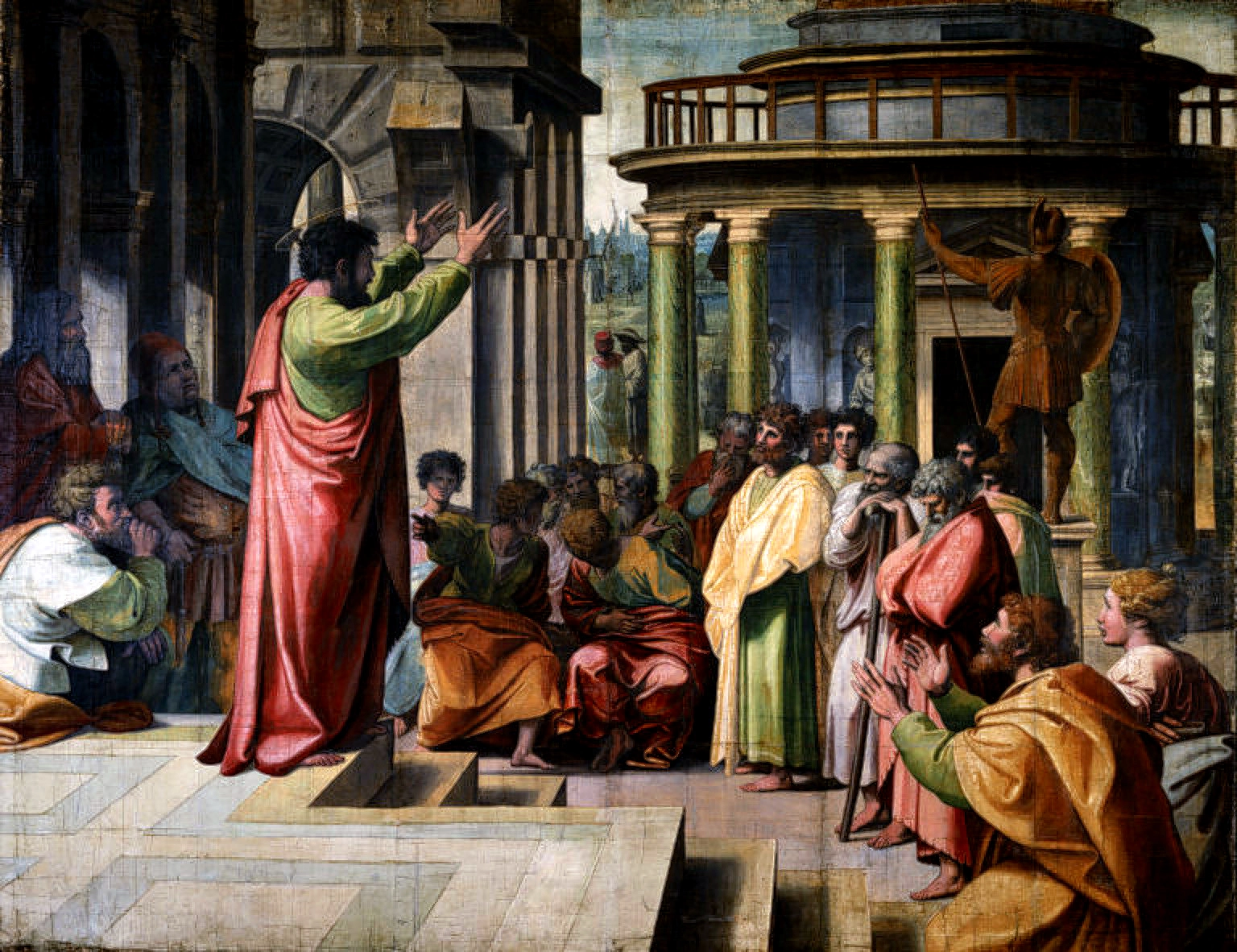
Paul preaching in Athens
The next question of the catechism sets up the rest of the section on Christ.
Q. 23. What offices doth Christ execute as our redeemer?
A. Christ, as our redeemer, executeth the offices of a prophet, of a priest, and of a king, both in his estate of humiliation and exaltation.
So Christ has three offices and two estates. The next questions deal with these five things. This week, we begin with Christ’s prophetic office.
Q. 24. How doth Christ execute the office of a prophet?
A. Christ executeth the office of a prophet, in revealing to us, by his word and Spirit, the will of God for our salvation.
Moses, of course, is one of the most important people in all the Bible, and his primary role was to speak God’s Word to the people. He was a prophet. But when we get to Deuteronomy, there’s a problem: Moses is about to die, and Israel’s access to new revelation from God will be limited. It’s in that context that we get this prophecy:
I will raise up for them a prophet like you from among their brothers. And I will put my words in his mouth, and he shall speak to them all that I command him. (Deuteronomy 18:18)
In Acts 3, Peter tells us explicitly that this prophet is Jesus Christ. With the advent of the prophet Jesus, there are no more prophets like the days of old. He is the last prophet, and he appointed his apostles to write down his teaching and close the canon of Scripture. Hebrews 1:1-2 reminds us of this:
Long ago, at many times and in many ways, God spoke to our fathers by the prophets, but in these last days he has spoken to us by his Son, whom he appointed the heir of all things, through whom also he created the world.
But what does it mean that Jesus is a prophet? It means that he is the person through whom God speaks. First, he speaks by his Word. In Luke 4, Jesus says that he was appointed to preach the gospel and to proclaim the Lord’s favor (Luke 4:18-19). In Matthew, he is presented as a new and better Moses as he stands on the mountain and preaches and interprets the Law to the people of Israel (Matthew 5-7). Second, he speaks through his Spirit. He promised to his disciples that the Spirit of God would come to testify and bear witness to the truth (John 15:26-27). He is the only mediator of God’s elect who brings the truth of God to his people, and the truth that he brings is the gospel, that he is the way, the truth, and the life, that no one comes to the Father except through him.
But how does Christ now execute that office since he is ascended? The answer is the same that he himself gave: by his Word and Spirit. In the Word of God, we have Jesus’ words. We, of course, have the red letters in the Gospels, but since Jesus is God, we find that he is actually the author behind all of Scripture. Every word of every prophet is the word of Jesus, so we’re called to hear him in Scripture as it has been handed down to us. By the power of his Spirit, Jesus reveals the Word to us. The Spirit provides illumination to the believer so that he not only hears the words of Jesus, but understands them and is changed by them.
The prime way this happens is in the public preaching of the Word. Through his appointed servants, the Prophet still speaks. In fact, one old way of referring to preaching is to call it prophesying. It’s not that the preacher has new revelation to give, but his prophetic ministry is to repeat the words of Christ to the Bride of Christ. This is the preacher’s call and commission.
So do you want to hear Jesus speak prophetically to you? Open your ears to the preaching of the Word in the Lord’s Day assembly. Listen as the minister reads the Word of God to you. Read the Word to your family and in your private worship. And pray that in all these things, the Spirit would guide you into sanctification and deeper fellowship with your Savior Prophet.
Psalm 3
I meant to share this last week, but here’s a recording of the psalm we’re singing over the next few weeks. Make not of the word “de-li-ver-ance” (4 syllables) in the last verse!
Updates
A congregational meeting is scheduled for March 30, 2025. We’ll meet immediately following the worship service to vote on a new rotational system for officers and elect new elders.
Your friend in Christ,
Reid
Bulletin for March 9, 2025
Download Sunday’s BulletinUpdates
Two major things to keep in mind:
-
This weekend, Rev. Ron Horgan will be with us for an evangelism training. We’ll meet at 9 AM on Saturday, tomorrow morning, with lunch to follow. Ron will also be preaching at our Lord’s Day service.
-
It’s time change Sunday! Be sure to set your clocks forward an hour, and drink an extra cup of coffee before church!
Your friend in Christ,
Reid
Bulletin for March 2, 2025
Download Sunday’s BulletinGod with Us and Like Us
In the last question, we learned that the Redeemer of God’s elect is Jesus Christ who is both God and man. Most Christians are used to this idea, but it’s not so simple as it first seems. This is actually one of the deepest questions of the Christian faith. In fact, what we believe about this is one of the things that makes us Christian (as opposed to some other religion). So the Catechism gives us a little help in wrapping our minds around this.
Q. 22. How did Christ, being the Son of God, become man?
A. Christ, the Son of God, became man, by taking to himself a true body and a reasonable soul, being conceived by the power of the Holy Ghost in the womb of the virgin Mary, and born of her, yet without sin.
The answer to this question divides into two parts. First, the Catechism talks about the ways that Christ is like us; in particular, it reminds us that Christ took to himself (1) a true body and (2) a reasonable soul. The body part is pretty easy for us to wrap our heads around. We know that Christ took on flesh and blood. The fullness of deity dwells in him bodily (Colossians 2:9). Is a human body a complete human? No! The body is only one part of us, we also have souls; therefore, in order to take on a full human nature, Christ must have a human soul as well.1 This is what Paul means when he says that Christ took on the “form” of a servant (Philippians 2:7). The word “form” is an extremely important word, but without getting into all the details, it’s sufficient to note that the form Paul is talking about is a human soul.
So Christ took on a body and soul just like ours, but he didn’t receive that body and soul like we do in the normal processes of human reproduction. Instead, his becoming man was miraculous. We are conceived through the union of man and woman, but it is through this normal course of life that Adam’s sin is imputed to us. This is, of course, why Jesus had to be born of a virgin. Christ, in order to maintain his perfection, couldn’t be born in the natural way.
Instead, he was conceived by the power of the Holy Spirit (Luke 1:35). As an aside, this fact is an evidence of the divine personhood of the Spirit: God is the only Creator, and the Spirit engages in creation ex nihilo, out of nothing, by creating a child in Mary’s womb. This miraculous birth, on one hand, protects Christ’s human nature from the stain of original sin, but it also makes a way for us to be freed from sin as well. Christ’s birth by the Holy Spirit is a reminder to us of our need to be reborn. When we are born again, we are born, “not of blood nor of the will of man, but of God” (John 1:13). We are born of water and the Spirit (John 3:5).
So Christ’s becoming man achieves two big things for Christians. First, the fact that he takes on a human nature means that he is able to be our Redeemer who redeems our fallen nature. And second, his manner of birth, by the power of the Holy Spirit, is the model for our manner of regeneration by the power of the Holy Spirit.
Updates
Next week, we have two special events coming up:
-
First, we’ll have an Ash Wednesday Service at 6 PM on March 5. Just as last year, there will not be an imposition of ashes. You can find the explanation here.
-
Then, on Saturday at 9 AM, Rev. Ron Horgan will be joining us to give an evangelism seminar with lunch to follow. Ron will also be preaching on Sunday.
Your friend in Christ,
Reid
-
The term “reasonable soul” is actually Medieval scholastic way of thinking, borrowing from older philosophical categories. Generally, theologians and philosophers have understood there to be three kinds of souls: vegetative (the kind plants have), animal (the kind animals have), and reasonable or rational (the kind humans and angels have). So when the Catechism refers to a “reasonable soul,” it’s drawing on this distinction. In other words, Christ has the same kind of soul that we have. ↩︎
Bulletin for February 23, 2025
Download Sunday’s BulletinEternal God, Eternal Man
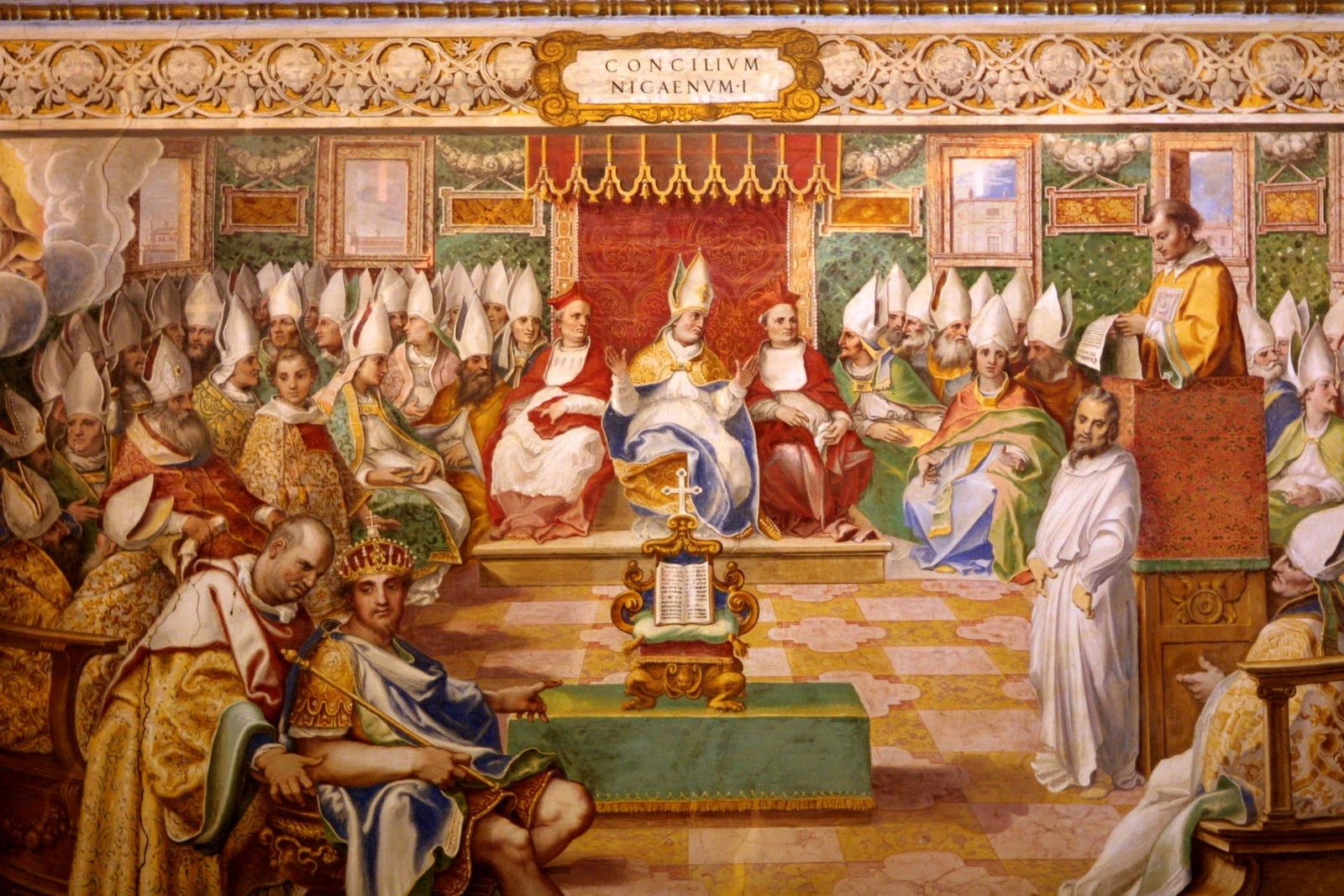
The First Council of Nicaea in session before Constantine
We’re back at the Shorter Catechism this week! We left off at question 20 which provided an answer to the problem of sin. That question reminds us that God did not leave mankind to perish, but provided a covenant of grace to bring the elect into an estate of salvation by a redeemer. The natural question then follows:
Q. 21. Who is the redeemer of God’s elect?
A. The only redeemer of God’s elect is the Lord Jesus Christ, who, being the eternal Son of God, became man, and so was, and continueth to be, God and man in two distinct natures, and one person, forever.
This is the first question of a series of questions about Christology, i.e., the study of Christ. This question is primarily concerned with the hypostatic union. This is a theology term used to describe the union of Christ’s two natures, one divine and one human, in the person (in Greek, the hypostatis) of the Son. This is an extremely important doctrine for Christians. In fact, a proper understanding is necessary for the gospel.
In the early centuries of the church, the doctrine of Christ was the primary place where error and heresy crept in. Even in the New Testament, we see the heresy of docetism, which is the idea that Christ did not have a real human body, but was merely a spirit. The next major error was Arianism, which holds that the Son is not the same essence as the Father. They even a wrote a popular hymn with the line “there was a time when the Son was not!” This error was addressed by the Council of Nicaea in their Creed which says the Son is “God of God, Light of Light, very God of very God; begotten, not made, being of one substance with the Father…” There were other errors as well, but they all fall into one of two ditches. On one hand, there’s a tendency to make Christ less than human (as in docetism). The other tendency is to make Christ less than God (as in Arianism). But orthodox, biblical Christianity holds that Christ is fully God and fully man.
This doctrine is extremely clear in the Bible. First, Jesus is God. Isaiah 9:6, a prophecy about Jesus, says that he is the “almighty God.” This is repeated in the gospels. His name is Emmanuel, God with us (Matthew 1:23), and he is the eternal Word who was with the Father in eternity (John 1:14). He is named as the Creator of the world (Colossians 1:16, John 1:3). His eternal sonship is attested throughout the gospels (Matthew 3:7, 17:5; John 1:18), and even in the Old Testament (Psalm 2:7).
Second, Jesus is man. He lived a fully human life, eating and drinking, sleeping and resting. And, of course, he even died a full human death on the cross, and a full human burial in the tomb. But he is also still a man, even now. In his Resurrection, although his body is glorifies, he still bears the marks of his suffering and death. And Acts 1:11 tells us that “this same Jesus” will return, not merely in spirit, but bodily.
But why? Why must Jesus be fully God and fully man? Because this is necessary for Jesus to be our Redeemer and Mediator! There is one God, and one mediator between God and man, the man Jesus Christ (1 Timothy 2:5-6). Fallen man cannot approach God to speak on his behalf, so God’s representative must be God himself. And God cannot redeem without justice, and that justice had to be poured out on a man. Jesus Christ meets both of these problems: he was and continues to be God and man in two distinct nature and one person forever.
Updates
-
Our Ash Wednesday service will be Wednesday, March 5, at 6 PM. Choir will not meet.
-
Rev. Ron Horgan will be with us on March 8th for an evangelism seminar. We’ll meet at 9 AM with lunch to follow.
Your friend in Christ,
Reid
